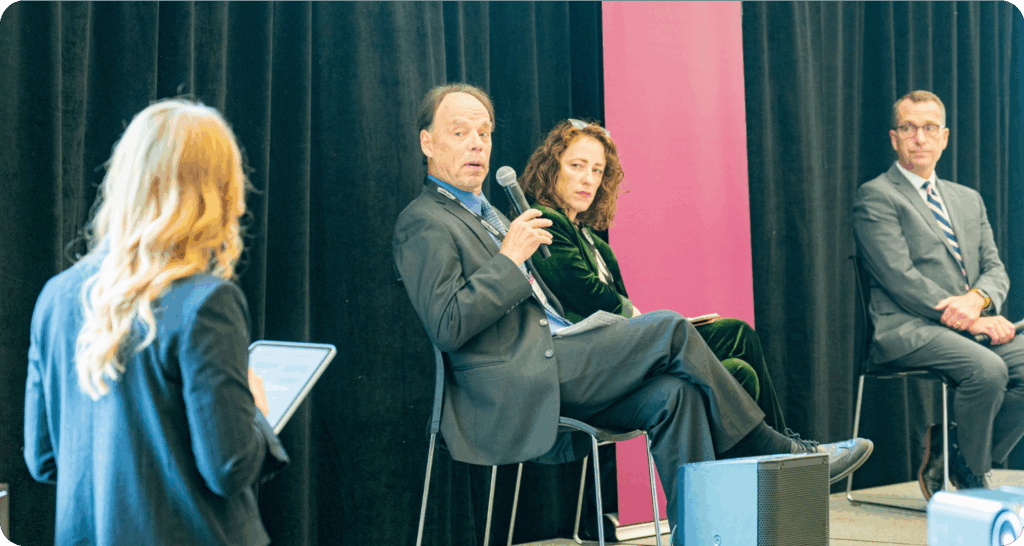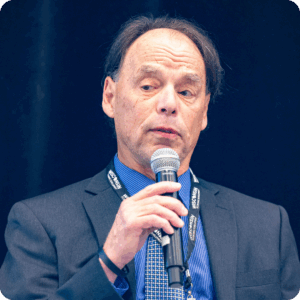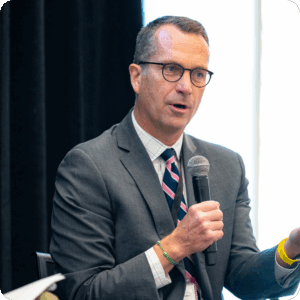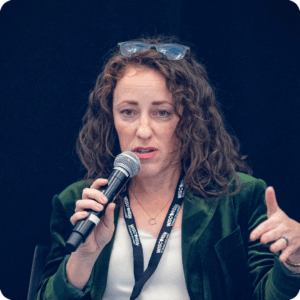
Panelists discuss fostering a growth-oriented community mindset at the 2025 Wisconsin Economic Summit.
Getting people to embrace change can be a challenge—even when that change represents growth and a viable path forward.
Four leaders who played key roles in moving contentious projects forward in their communities shared their advice in a panel discussion titled “Fostering a Community Mindset Grounded in Possibility and Growth” at the 2025 Wisconsin Economic Summit held in mid-October.

Dan Ertl, director of community development for the City of Brookfield, at the 2025 Wisconsin Economic Summit
For all these projects—building affordable housing in Brookfield, a tiny home village for veterans in Green Bay, and a data center in Port Washington, as well as shifting community attitudes to ensure economic sustainability in Three Lakes—transparency and communication have been crucial factors in overcoming opposition and advancing projects, panelists said.
Stirring up community support
Daniel Ertl, director of community development for the city of Brookfield—which overcame opposition from both residential and commercial neighbors to advance a workplace housing project in a business park—said assembling a broad network of advocacy groups to assist in building support for your cause is another major component to success. Ertl also advised putting a human face on the beneficiaries of a given project: He said it had been helpful to specify that the Brookfield project’s new housing units for people earning between $45,000 and $85,000 a year would create an affordable option for nurses, teachers, and firefighters in the community.

City of Port Washington Mayor Ted Neitzke IV at the 2025 Wisconsin Economic Summit
In Port Washington, where opposition to a proposed data center was fueled by an online video by comedian Charlie Berens urging residents to challenge the project, Mayor Theodore Neitzke said continuously putting out as much positive information as possible, including answers to the questions posed by opponents, was instrumental in moving the project forward. The data center project came about after the city lost out on a major development and asked, “What else can we do?” to make the next attempt successful. Neitzke said this led to the data center project, as the community searched for a development opportunity that would create a manageable number of jobs while limiting negative impacts such as pollution.
In Green Bay, neighborhood opposition arose after a husband-and-wife development team proposed building a tiny home village with support services for veterans on 3 acres of the 33-acre site of the former Brown County Mental Health Center. “We didn’t anticipate the amount of kickback,” Will Peters, city housing development specialist said, adding that opposition ran the gamut from stereotypes about people experiencing homelessness being unstable to personal attacks on the developers—and concerns about an unmapped cemetery on the grounds of the former mental health center. “They just didn’t relent.”
Ultimately, the needs and wants of neighbors opposing the project had to be balanced with the needs and priorities of the entire city, said Peters, who described the project as ”something we just have to do because it’s the right thing to do.” He said leading with the facts and addressing concerns up front help to move a project forward.
Evolving attitudes support sustainable growth

Jacqui Sharpe, director of the Three Lakes Area Visitors Bureau, at the 2025 Wisconsin Economic Summit
The town of Three Lakes in Oneida County, which has been a tourist destination for more than a century, is facing the much broader challenge of “an entire community mindset shift,” said Jacqui Sharpe, director of the Three Lakes Visitors Bureau.
“For 100 years, people visited the area, fell in love with the area, moved there with their families, could make a living,” Sharpe said, adding new visitors would come to stay at area resorts every week, bringing tourist dollars with them. But in the past few decades, “we have shifted away from the traditional resorts,” Sharpe said. “We are now 70% second homes.”
In 2019, the community lost its last hotel—which had been the “heart of our downtown”—in a fire, Sharpe said. And while the community wants to bring the hotel back, there are no firm plans for how to do that yet.
Since the community has transitioned to being mostly second homes, living there full time has become less tenable—including for the people who fill essential roles in service industries.
Sharpe cautioned against what she called “toxic nostalgia”—fondness for a way of life that doesn’t make sense in the current era. “We are trying to guide conversations for a new path forward where we can continue to be Three Lakes” in a way that works for the present and the future, she said. “If we don’t have conversations now about what we do want, the answer is the death of our community.”
Neitzke said having a strategic plan is essential. “If you’re intentional, good things will happen,” Neitzke said. “Courage and tenacity are what’s going to win the day.”
